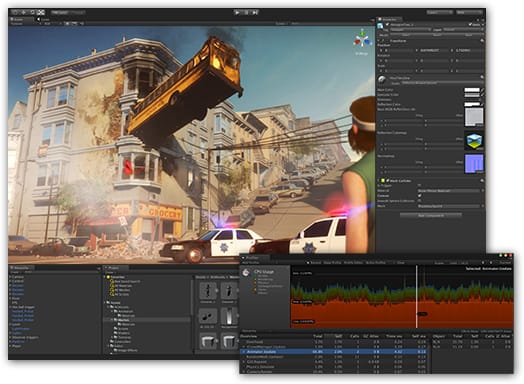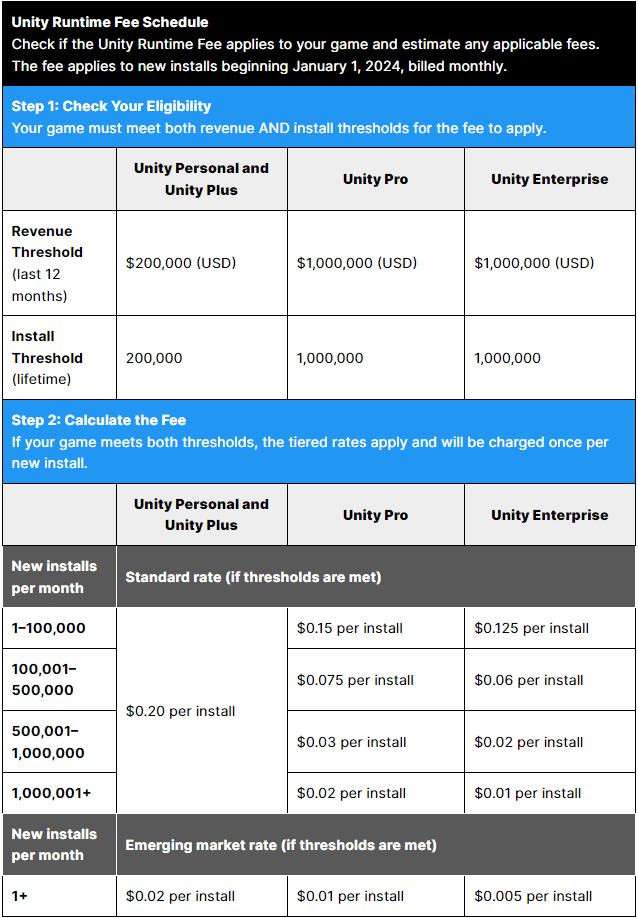Unity Pricing
Plan Pricing & Packaging Updates
Many in the community are already familiar with the Unity Engine, a software duo consisting of the Unity Editor and the Unity Runtime. The Unity Runtime, crucial for running Made with Unity games on player devices and enabling them to reach a vast audience, accounting for billions of monthly downloads.
In their ongoing commitment to supporting creators, Unity is rolling out a new initiative known as the Unity Runtime Fee. This fee is predicated on each download of a qualifying game by an end user. Unity has opted for this approach because each game download also necessitates the installation of the Unity Runtime. Their rationale behind this decision is to establish an initial install-based fee, allowing creators to retain the continuous financial benefits derived from player engagement, rather than opting for a revenue-sharing model.
Thresholds for Revenue and Installs
Games become eligible for the Unity Runtime Fee once they fulfill two key criteria:
- The game must exceed a minimum revenue threshold within the past 12 months.
- The game must attain a minimum lifetime install count.
These revenue and game install thresholds have been intentionally set at a relatively high level. This decision is aimed at ensuring that developers who are still in the process of achieving significant success won’t be burdened by this fee prematurely. In essence, you won’t be required to pay the fee until your game has reached substantial milestones.
Only games meeting the following criteria will qualify for the Unity Runtime Fee.
- Unity Personal and Unity Plus: Games that have generated $200,000 USD or more in the last 12 months and have a minimum of 200,000 lifetime game installs.
- Unity Pro and Unity Enterprise: Games that have generated $1,000,000 USD or more in the last 12 months and have a minimum of 1,000,000 lifetime game installs.
Flexibility and Discounts for Unity Personal, Pro, and Enterprise
Commencing on January 1, 2024, the new policy offers Unity Personal to all, regardless of their revenue, with the primary aim of providing increased flexibility in license management. Once a game exceeds the revenue and install thresholds, a nominal flat fee per install is levied (please see the table below for reference).
To ensure scalability, subscribers of Unity Pro and Unity Enterprise are entitled to volume discounts that substantially reduce the per-install cost associated with the Unity Runtime Fee. This arrangement implies that, alongside various other advantages, the expenses associated with Unity Pro and Unity Enterprise licenses can be counterbalanced by the savings achieved as your game experiences growth.
Furthermore, Unity’s fee structure is designed to consider the varying nature of game monetization across distinct regions. This spans from well-established gaming markets like North America and Europe to emerging gaming territories such as India.
In November, Unity is set to enhance various Unity subscription plans, aiming to deliver enhanced value to its users. These updates encompass an array of new features and capabilities, such as advanced collaboration tools through Unity DevOps, cloud-based asset management via Unity Asset Manager, robust role and access controls facilitated by Team Administration, and the seamless integration of AI functionality at runtime through Unity Sentis.
This initiative is driven by a commitment to offering users more powerful tools and services, all while maintaining current seat prices. The goal is to assist developers in effectively managing the increasing complexity of game development. Here’s a detailed breakdown of what these updates entail:
- Unity Sentis for All: Unity is extending the availability of Unity Sentis to all Unity plans. This expansion enables developers to effortlessly integrate a real-time AI model into the Unity Runtime of their games or applications, all without the need for additional cloud-compute expenses or the introduction of latency.
- Unity Personal: This plan will now include the Unity Asset Manager free tier (with 10GB storage in total), a maximum of 3 Unity DevOps seats featuring 5GB of storage and 200 Windows build minutes, as well as Team Administration base roles.
- Unity Pro: Subscribers to this plan will enjoy the Unity Asset Manager, complete with 50GB of storage per seat (pooled for team use), along with an equal number of Unity DevOps seats featuring 5GB of storage and 200 Windows build minutes. Team Administration tools for access management are also included.
- Unity Enterprise: For Enterprise subscribers, the Unity Asset Manager will provide a generous 120GB of storage per seat (pooled for team use), along with an equal number of Unity DevOps seats offering 5GB of storage and 200 Windows build minutes. The package also encompasses advanced Team Administration tools, including custom roles and Single Sign-On (SSO) capabilities, offering a heightened level of control.
As part of this update, Unity Plus is being retired for new subscribers starting from today, September 12, 2023. This streamlines our subscription offerings. Existing Unity Plus subscribers will receive an email in mid-October with an exclusive opportunity to upgrade to Unity Pro for one year at the current Unity Plus price, so no immediate action is required.


![Unity game Unity game Unity New Pricing - Additional Charges on Installs [Changed]](https://2dudestudios.com/wp-content/uploads/2023/09/Unity-game-300x169.jpg)


